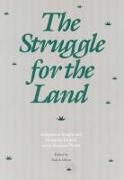- Start
- The Struggle for the Land
The Struggle for the Land
Angebote / Angebote:
At an 1887 council when his people were told to learn farming in the semidesert region east of the Wind River Mountains, the Shosone chief Washakie exploded with "God damn a potato!" His instincts were all against the cultivation of semiarid land. The relationship between the buffalo hunter and the potato eater–between indigenous peoples and industrial empire–is the basic theme of the studies in The Struggle for the Land. As the editor, Paul A. Olson, points out in his introduction, the theme is as old as the biblical battle between the descendents of Nimrod, the city dweller, and of Abraham, the pastoralist. But the environmental cost of developing the world's semiarid regions is a new and urgent concern. Soil erosion, the loss of lands to dams, the pollution of once productive regions through mining, and the destruction of native food plants have everywhere decreased the quality of life for indigenous peoples, who have been forced to adopt the Western agricultural practices, property concepts, and economic institutions that created the environmental crisis. The eleven chapters in this collection look at the industrial and indigenous relationships in the lands of the North American Plains Indians, the Australian Aborigines, the Kazakhs in the USSR, the Maasai in Kenya, and several groups in southern Africa, and Alaskan and Lapp (Saami) native peoples. Representing a broad range of disciplines, including anthropology, history, ecology, and agricultural science, the contributors are John W. Bennett, Anatoly Khazanov, Russel L. Barsh, Gary C. Anders, Robson Silitshena, Peter Iverson, Patrick Morris, Annette Hamilton, J. Baird Callicott, O. Douglas Schwarz, and Solomon Bekure and Ishmael Ole Pasha. They recommend realistic solutions for the problems facing people who have essentially been disenfranchised by Western-style developmentof their native semiarid lands.
Folgt in ca. 15 Arbeitstagen

